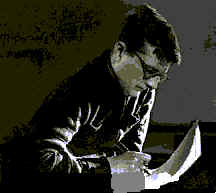Shostakovich,
Dmitri Dmitrievich
(1906-1975), the leading Soviet composer of the mid-20th century. Born on September 25, 1906, in St Petersburg and trained (1919-1925) at the city's
conservatory, he first attracted international attention with the premiere of his First
Symphony (1926). His music is distinguished principally by its rhythmic vitality and its
rich melodies, which are frequently reminiscent of the gypsy tunes popular in eastern
Europe. Most of his large works are composed in traditional forms, and his mature harmonic
style is usually simple and direct. His technical mastery of the orchestra is particularly
notable.
Born on September 25, 1906, in St Petersburg and trained (1919-1925) at the city's
conservatory, he first attracted international attention with the premiere of his First
Symphony (1926). His music is distinguished principally by its rhythmic vitality and its
rich melodies, which are frequently reminiscent of the gypsy tunes popular in eastern
Europe. Most of his large works are composed in traditional forms, and his mature harmonic
style is usually simple and direct. His technical mastery of the orchestra is particularly
notable.
Shostakovich's
first opera, The Nose (1929), modelled on the Expressionist and atonal idiom of
such Western composers as the German Paul
Hindemith
and the Austrian Alban
Berg,
was well received by the critics and public but was censored by Communist party officials
as bourgeois and decadent. His next opera, Lady Macbeth of Mtsensk (1934; revised
as Katerina Izmailova, 1963), again received both popular and critical acclaim, but
party publications condemned the opera as counter-revolutionary. Such attacks led him to
promise to reformulate his artistic ideas.
Shostakovich's
Fifth (1937; subtitled “a Soviet artist's response to just criticism”) and Sixth
(1939) symphonies were well received, both by the party and the public, and his Seventh
Symphony, the Leningrad (1942),
composed during the World War II siege of Leningrad, became a great popular success. In
1948 his music was again attacked on political grounds, and once more he promised to
reform his musical style. He apparently did so satisfactorily, for he received the Order
of Lenin, the supreme Soviet honour, in 1956. Shostakovich was also awarded the Stalin
Prize several times, and in 1966 he became the first composer to receive the accolade Hero
of Socialist Labour. He died in Moscow on August 9, 1975.
Shostakovich's
fifteen string quartets (1935-1974) have won increasing respect as a major contribution to
the literature. Among his other works are six concertos (two each for piano, violin, and
cello), a total of fifteen symphonies, ballet music, songs, and film scores. Despite
occasional flirtations with atonality
in his earlier works, Shostakovich's achievement as a whole has been seen as an important
contribution to tonal music at a time when his most influential contemporaries were
turning either to serialism or Neo-Classicism. This can be seen especially in the
symphonies, which continue the legacy of Gustav
Mahler,
both in form and harmonic language.
Home
| Back
 Born on September 25, 1906, in St Petersburg and trained (1919-1925) at the city's
conservatory, he first attracted international attention with the premiere of his First
Symphony (1926). His music is distinguished principally by its rhythmic vitality and its
rich melodies, which are frequently reminiscent of the gypsy tunes popular in eastern
Europe. Most of his large works are composed in traditional forms, and his mature harmonic
style is usually simple and direct. His technical mastery of the orchestra is particularly
notable.
Born on September 25, 1906, in St Petersburg and trained (1919-1925) at the city's
conservatory, he first attracted international attention with the premiere of his First
Symphony (1926). His music is distinguished principally by its rhythmic vitality and its
rich melodies, which are frequently reminiscent of the gypsy tunes popular in eastern
Europe. Most of his large works are composed in traditional forms, and his mature harmonic
style is usually simple and direct. His technical mastery of the orchestra is particularly
notable.